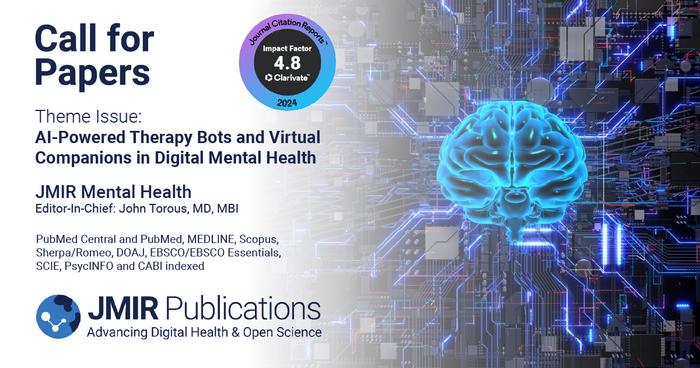In recent years, the intersection of artificial intelligence (AI) and mental health has sparked tremendous interest across both academic and clinical domains. The burgeoning field of AI-powered therapy bots and virtual companions promises to transform the landscape of digital mental health care by providing scalable, accessible, and cost-effective interventions. Recognizing this revolutionary potential, JMIR Publications has announced an open call for submissions for a special theme issue entitled “AI-Powered Therapy Bots and Virtual Companions” in its esteemed open access journal, JMIR Mental Health. This initiative aims to catalyze rigorous investigation into not only the efficacy but also the underlying mechanisms, ethical considerations, and contextual applicability of these innovative tools.
While early iterations of mental health chatbots and avatars have primarily focused on demonstrating feasibility and user acceptability, the discipline now demands a pivot towards more critical, evidence-driven research. There is a growing need to unravel the clinical relevance of these digital agents beyond surface-level engagement metrics. For instance, how do therapy bots compare against active control conditions such as digital placebos or attention controls in real-world therapeutic outcomes? Understanding the nuances that distinguish genuine therapeutic change from placebo effects is vital to establishing clinical credibility and guideline integration.
Engagement is another pivotal factor warranting in-depth exploration. Unlike traditional face-to-face therapy, where sustained interaction is benchmarked by session attendance and therapeutic alliance, AI companions challenge conventional definitions of engagement. Researchers are urged to propose robust methodologies to operationalize and quantify meaningful and sustained engagement with therapy bots. Metrics that capture qualitative dimensions like emotional attunement, responsiveness, and adaptive feedback loops may offer richer insights than mere frequency or session length.
The ethical landscape surrounding AI-powered mental health tools introduces complex dilemmas. There is a pressing need to systematically examine potential risks such as data privacy breaches, inadvertent harm from inaccurate advice, and the psychological impact of human–machine boundaries becoming blurred. In particular, AI companions deployed across diverse cultural or socioeconomic contexts may inadvertently propagate biases or reinforce stigmas, necessitating vigilant scrutiny. As these digital entities increasingly influence vulnerable populations, ethical frameworks must evolve to address questions of autonomy, informed consent, and accountability in an automated care environment.
From a clinical perspective, delineating the therapeutic mechanisms encapsulated by AI companions remains a frontier topic. Are these tools simply delivering evidence-based psychotherapeutic techniques in algorithmic form, or do they uniquely modulate cognitive and affective processes through their interactive design? Emerging theories propose that AI agents may enhance self-efficacy, promote behavioral activation, or even replicate aspects of the therapeutic alliance through advanced natural language processing and empathetic response generation. Validating these hypotheses through rigorous experimental designs will provide foundational knowledge to optimize AI intervention architecture.
Equally critical is the performance evaluation of therapy bots across a spectrum of psychiatric diagnoses and demographic groups. Mental disorders vary widely in symptomatology, severity, and treatment responsiveness, which may influence how users engage with and benefit from AI-based interventions. Factors such as age, cultural background, digital literacy, and co-morbid conditions introduce layers of complexity in assessing effectiveness. Research that stratifies outcomes and tailors intervention components to diverse populations will enhance the inclusivity and generalizability of AI mental health solutions.
The integration of AI companions within broader mental health care models raises important questions about their complementary role alongside human clinicians. While some envision these tools as adjuncts augmenting traditional therapy, others propose fully automated pathways for mild to moderate conditions. Understanding optimal points for intervention, escalation protocols, and hybrid care delivery systems will be crucial for seamless incorporation into health care infrastructures. Such system-level research demands interdisciplinary collaboration including clinical psychology, computer science, health services research, and ethics.
JMIR Mental Health’s theme issue invites contributions employing cutting-edge methodologies, from randomized controlled trials to mixed-methods studies, modeling techniques, and qualitative explorations. The journal emphasizes peer-reviewed, high-impact submissions that scrutinize the complex interplay between technological innovation and mental health outcomes. Researchers are encouraged to address pressing issues such as measurement standardization, reliability and validity of AI-delivered interventions, and longitudinal impact assessments.
Given the rapid evolution of AI capabilities—embodied by advancements in machine learning algorithms, natural language understanding, and affective computing—this theme issue seeks forward-looking perspectives that anticipate future trajectories. Investigations into adaptive learning algorithms that personalize therapy content or harness real-time physiological monitoring present exciting frontiers. Moreover, assessing the scalability and sustainability of AI mental health tools in low-resource settings will have profound implications for global mental health equity.
In addition to empirical research, discourse on regulatory frameworks, reimbursement policies, and public health implications is welcomed. As jurisdictions grapple with overseeing digital therapeutic products, scholars must engage with policy dimensions to ensure safe, effective, and ethical deployment. The convergence of technological innovation and regulatory oversight ultimately shapes the societal impact of AI-driven mental health care.
Contributors interested in submitting manuscripts for this special issue should note the deadline is October 31, 2025. All papers will undergo a stringent peer-review process consistent with JMIR Publications’ standards of scientific rigor and ethical integrity. Accepted articles will be collectively published as a themed compilation titled “AI-Powered Therapy Bots and Virtual Companions in Digital Mental Health,” aiming to become a definitive reference in the field.
This initiative by JMIR Mental Health underscores the transformative potential and challenges inherent in harnessing artificial intelligence for mental health improvement. Through fostering critical and multidisciplinary scholarship, the special issue aspires to propel the responsible integration of AI companions in clinical practice, research, and policy.
Subject of Research: AI-powered mental health tools including therapy bots and virtual companions, with a focus on their effectiveness, engagement, ethical implications, and clinical integration.
News Publication Date: May 13, 2025
Web References:
https://www.jmir.org/
https://mental.jmir.org/
https://mental.jmir.org/announcements/567
Image Credits: JMIR Publications. Source: BlackJack3D
Keywords: Mental health, Artificial intelligence, Psychiatry, Cognitive robotics




